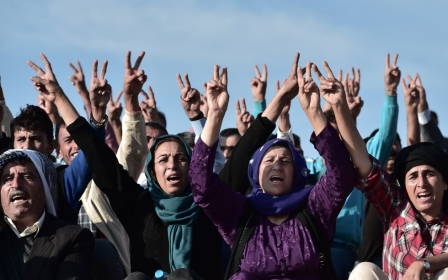Iran criticises 'confusion' in US foreign policy

The fevered partisanship of US politics is damaging the country's foreign policy, Iran said on Saturday, hitting out at threats of military action against it should nuclear diplomacy ultimately fail.
The comments in Tehran came after US President Barack Obama said in a letter that all options remain on the table against Iran.
Iran and six world powers led by the US struck a deal last month on Tehran's disputed nuclear programme but it is undergoing a bruising review in Congress and has yet to be implemented.
"Political partisanship and competition have taken US foreign policy hostage," foreign ministry spokeswoman Marzieh Afkham said, calling Obama's remarks "repetitive and baseless".
These claims are "showing the uncertainty and depth of confusion of American officials in determining their national interests," Afkham said, according to the official IRNA news agency.
The US president said in a letter to Jerrold Nadler, a Democrat who has announced his support for the deal, that the agreement is good for America, Israel and the Middle East in general.
"We have a wide array of unilateral and multilateral responses that we can employ if Iran fails to meets its commitments," Obama said.
"All of the options available to the United States - including the military option - will remain available through the life of the deal and beyond," he added.
Opponents say the accord goes too easy on Iran by not allowing spot inspections of nuclear sites or forcing it to halt support of militant groups, for instance.
They claim that it paves the way to Tehran obtaining a nuclear bomb.
Obama has said the deal does precisely the opposite, and Iran denies seeking an atomic weapon.
So far only two Democratic senators -- Chuck Schumer and Robert Menendez -- have come out publicly against the accord.
If Congress chooses to reject the deal, Obama will still be able to veto the move as long as Republicans fail to obtain a two thirds majority against it.
But it is unlikely that opponents can muster the two-thirds majority they would to override a certain Obama veto if an initial vote by lawmakers rejects the accord.
Nadler said on Friday he supports it. It is not perfect, but it "gives us the best chance of stopping Iran from developing a nuclear weapon," he said in a statement.
Nadler said he had reached this conclusions from his perspective as "an American Jew who is both a Democrat and a strong supporter of Israel".
Iran unveils new short range ballistic missile
Meanwhile, Iran's President Hassan Rouhani unveiled the country's latest domestically produced surface to surface missile on Saturday, saying such weapons are necessary for defence in the Middle East.
The Fateh (Winner) 313 ballistic missile has a 500-kilometre (300 miles) range and features more advanced sensors and technology, according to Sepah News, the website of Iran's powerful Revolutionary Guards.
It was rolled out little more than a month after Iran and world powers concluded the deal that requires Iran to curb key parts of its nuclear programme in exchange for a lifting of economic sanctions.
The missile was displayed as part of Defence Industry Day, an annual event that showcases Iran's hardware.
"A weak country incapable of confronting and defending against the military power of its neighbours and enemies cannot claim to seek peace," the president said in a televised speech, citing the need for diplomacy and military efforts to stand side by side.
"Iran's strategy is based on defence and deterrence. The first line is diplomats and the second line is generals. Diplomats should be backed by generals. If they fail, it is the generals' turn to come forward."
Several versions of the Fateh missile have been produced in the past few years. The 313 model has been successfully tested and is scheduled for mass production, the Sepah News report said.
Iran's ballistic missile programme was a contentious issue in the talks that led to the nuclear deal in Vienna on 14 July.
To ensure a lifting of sanctions Iran must implement changes to its atomic activities and guarantee they are for energy and medical purposes. Iran has always denied seeking a nuclear bomb.
The latest UN Security Council resolution adopting the nuclear agreement bars Iran from owning missiles "designed to carry nuclear warheads".
It also stipulates that transfer to Iran of ballistic missile technology during the next eight years will be subject to the approval of the council. The US has said it would veto such requests.
Stay informed with MEE's newsletters
Sign up to get the latest alerts, insights and analysis, starting with Turkey Unpacked
Middle East Eye delivers independent and unrivalled coverage and analysis of the Middle East, North Africa and beyond. To learn more about republishing this content and the associated fees, please fill out this form. More about MEE can be found here.




